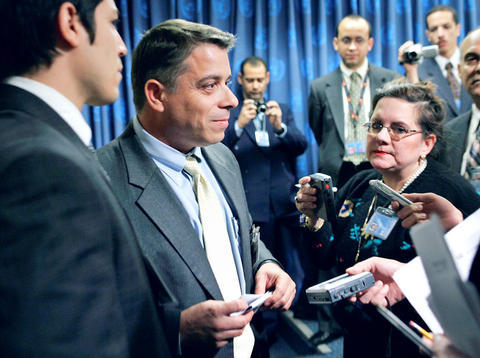Cuba on Thursday signed two cornerstone UN covenants on human rights passed more than 40 years ago in an unprecedented gesture that came just days after Raul Castro took over as president.
For decades, former president Fidel Castro had refused to sign the two covenants adopted by the UN General Assembly in 1966, saying to do so would be to cede to US pressure.
But Cuban Foreign Minister Felipe Perez Roque told reporters that foreign pressure played no part in his signing of the International Covenant on Economic, Social and Cultural Rights and the International Covenant on Civil and Political Rights.

PHOTO: AP
The signing "formalizes and reaffirms Cuba's commitment to the rights protected in both instruments, which my country has been systematically implementing since the time of the Cuban revolution in 1959," he said after conferring with UN Secretary-General Ban Ki-moon. "The act of signing both covenants responds to a sovereign decision of the Cuban government."
"Cuba has never acted nor will act under pressure," he said.
It was the first international act taken by the new leadership of Raul Castro, who took over on Sunday.
But Perez Roque said that "as far as the scope and application of several of the elements contained in these international instruments, Cuba will register those reservations or interpretative declarations it considers relevant."
Reacting to the signing of the rights treaties, the Cuban opposition demanded political pluralism and an end to harassment.
The most radical dissidents in Cuba denounced what they called "a farce" while their more moderate counterparts voiced hope the move would open the way for freedom of expression.
A total of 236 known political prisoners are held in Cuban jails.
"Now that Cuba has signed an international human rights treaty committing itself to uphold freedom of expression, it should immediately and unconditionally release the 22 independent journalists currently imprisoned for their work," said Carlos Lauria, Americas senior program coordinator for the Committee to Protect Journalists in New York.
Perez Roque also used the occasion to again call for the lifting of the US trade and economic embargo in force against his country since 1962.
The embargo and Washington's hostility against Cuba constitute the most serious obstacle to the enjoyment by the Cuban people of the rights protected by the covenants, he said.
Meanwhile, US President George W. Bush on Thursday slammed Raul Castro as a "tyrant" lacking legitimacy and unworthy of bilateral leadership-level talks.
"He's nothing more than the extension of what his brother did, which was to ruin an island and imprison people because of their beliefs," Bush told a White House press conference on Thursday.
Raul Castro was elected to the presidency in a vote by the national assembly.

Authorities have detained three former Taiwan Semiconductor Manufacturing Co (TMSC, 台積電) employees on suspicion of compromising classified technology used in making 2-nanometer chips, the Taiwan High Prosecutors’ Office said yesterday. Prosecutors are holding a former TSMC engineer surnamed Chen (陳) and two recently sacked TSMC engineers, including one person surnamed Wu (吳) in detention with restricted communication, following an investigation launched on July 25, a statement said. The announcement came a day after Nikkei Asia reported on the technology theft in an exclusive story, saying TSMC had fired two workers for contravening data rules on advanced chipmaking technology. Two-nanometer wafers are the most

NEW GEAR: On top of the new Tien Kung IV air defense missiles, the military is expected to place orders for a new combat vehicle next year for delivery in 2028 Mass production of Tien Kung IV (Sky Bow IV) missiles is expected to start next year, with plans to order 122 pods, the Ministry of National Defense’s (MND) latest list of regulated military material showed. The document said that the armed forces would obtain 46 pods of the air defense missiles next year and 76 pods the year after that. The Tien Kung IV is designed to intercept cruise missiles and ballistic missiles to an altitude of 70km, compared with the 60km maximum altitude achieved by the Missile Segment Enhancement variant of PAC-3 systems. A defense source said yesterday that the number of

A bipartisan group of US representatives have introduced a draft US-Taiwan Defense Innovation Partnership bill, aimed at accelerating defense technology collaboration between Taiwan and the US in response to ongoing aggression by the Chinese Communist Party (CCP). The bill was introduced by US representatives Zach Nunn and Jill Tokuda, with US House Select Committee on the Chinese Communist Party Chairman John Moolenaar and US Representative Ashley Hinson joining as original cosponsors, a news release issued by Tokuda’s office on Thursday said. The draft bill “directs the US Department of Defense to work directly with Taiwan’s Ministry of National Defense through their respective

Tsunami waves were possible in three areas of Kamchatka in Russia’s Far East, the Russian Ministry for Emergency Services said yesterday after a magnitude 7.0 earthquake hit the nearby Kuril Islands. “The expected wave heights are low, but you must still move away from the shore,” the ministry said on the Telegram messaging app, after the latest seismic activity in the area. However, the Pacific Tsunami Warning System in Hawaii said there was no tsunami warning after the quake. The Russian tsunami alert was later canceled. Overnight, the Krasheninnikov volcano in Kamchatka erupted for the first time in 600 years, Russia’s RIA